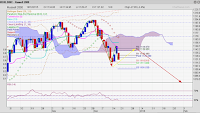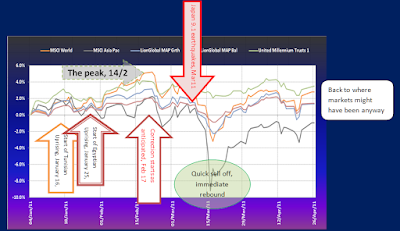Interest Rate Hike Now - Or When?
The Old Game
Mr Bernanke's statement often contained hints, kernels of truth and some points to ponder. The latter always proved a challenge to the investment community. When he said, he considers an end to quantitative easing, (May 2014) the market reacted vehemently with a sharp drop, so as to tell him, "don't mess with the stock market". It worked like a ping pong game:- Mr Bernanke "serves" - the end to QE,
- they (=investors) "smash" straight at him,
- he "slices" back with a moderated suggestion,
- they return hard, and he stretches for a conciliatory "backhand", to re-establish the status quo, i.e. "FED is not going to kill QE just yet"!
- They hit the winning spin... and markets rally to new highs...
As the game wears on, exhaustion sets in: More sliced backhands at the distress corner ("QE must end") and market participants get used to catching the drift, - and adopt the new style of play. And so - the mental preparedness rises for the eventual end to QE and does not lead to an inevitable market collapse as predicted.
The New Kid
Today, the FED faces a different set of realities. The task is to return to a normal interest rate environment. Somehow, the new chief, Ms Yellen, is not quite as subtle - and as straightforward in her decision making as her predecessor was. She cares but fails to impress market participants to the point of compliance with her view (or at least getting used to it). Running out of time for another ping pong game, there appears little playfulness on the part of investors, and the FED. The mood is deadly serious - as are market responses. Sadly, the messages from the FED do not result in straight hits, rather - the intellectual waters become muddied, little can be labeled as black or white, right or wrong.
China's Yuan Devalued
The self preserving move by the Chinese government in devaluing the Yuan has taken away the thunder - and likely effect of a US interest rate hike. It still astounds me that such a "local" decision could create such a huge swing in global equity (losses of 10% or more in August) and commodity prices. I can only deduce that investors had unrealistically high expectations for the outcome of a unilateral, unchallenged FED action. Now, it looks as though even the widely anticipated rate rise can be seen as ambiguous.
- The FED raise rates
I don't think that it matters much as to how much, but if interest rates will go up by next Friday, markets will probably experience a knee jerk and then try to recover some composure. This kneejerk, however, is merely a psychological letting-off-steam. It may result in equity prices see a few bid down-days while the USD briefly soars against many global currencies. What follows next? As before when QE needed to come to an end, the realisation will set in that the move was indeed justified and necessary to reclaim some fiscal control over the economy.
It is therefore likely that the stock market settles - at a lower level, and, especially when the economic indicators support it, the USD will come down to current levels, or even drift lower, when it becomes clear that it would help the US economy compete globally. Bond prices could see some volatility, though I imagine that after such a long build up toward "normalising" interest rates, prices would have had time to adjust, i.e. today's prices already reflect the higher rates and thus smooth the likely impact, especially for longer dated bonds (=time to maturity of 10 years and more).
2. The FED leaves rates at a low 0.25%
Should the FED decide against a rate rise, then many expect the USD to drop like a stone, and - equities to rally sharply. They are convinced that this intrinsic inverse correlation will persist. I am not so sure that will happen. Bond prices will probably rally, but equities will be reflect more uncertainty that is dampening market spirits.
Remember, China's economy, until very recently the one and only "driver" for many local economies in Asia, Europe and the US, is slowing down. That means, many of those countries who did not foresee such an outcome are hard hit. Add to that the huge drop in commodity prices and the global economy seems to be on the verge of a slump of unquantifiable proportions. Which is why all central banks would welcome inflation! A sizeable slump could lead uncomfortably close to deflation, a risk that is considered much graver than inflation.
Confusion prevails
So if not now, when should the FED raise interest rates? Fundamentally, there are clear parameters: a strong economy and a positive outlook for inflation. Technically, and cyclically, a likely rate hike will probably only come next year. This option of a one off move, coupled with a conditioned long-term pause before the next, would only send the worst kind of message to markets, that of utter confusion.
Whatever the FED decides next, the markets are already struggling to "maintain a positive frame of mind", i.e. have a clear concept of where to invest and which direction to bet on. The next 2-3 weeks I foresee as a foreplay to yet more selling pressures in November and December. And for those who think that CASH is king, - be mindful of the ongoing currency war. Not every currency can be a winner, - nor do current conditions aim for winners! Rather, each country wants their currency to be the most competitive. A strong currency is seen as a detriment to economic survival.
Whatever the FED decides next, the markets are already struggling to "maintain a positive frame of mind", i.e. have a clear concept of where to invest and which direction to bet on. The next 2-3 weeks I foresee as a foreplay to yet more selling pressures in November and December. And for those who think that CASH is king, - be mindful of the ongoing currency war. Not every currency can be a winner, - nor do current conditions aim for winners! Rather, each country wants their currency to be the most competitive. A strong currency is seen as a detriment to economic survival.



Comments